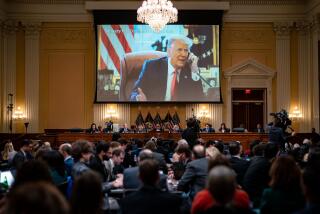Iraqi leader denounces report
- Share via
BAGHDAD — Iraq’s president lashed out at the Iraq Study Group report Sunday, saying it undermines his nation’s sovereignty and constitution and “works against Iraq’s long struggle against dictatorship.”
President Jalal Talabani, head of state for two consecutive Iraqi governments and a longtime U.S. ally, accused the bipartisan U.S. commission of condescension and ignorance.
“They are dealing with us as if we are an emerging colony, doing whatever they like,” Talabani said.
The report, on ways to end the war, is “not fair, not just,” he said. “I think it contains some very dangerous articles.”
The president balked at such key proposals as the commission’s suggestion that Iraq further strengthen and centralize government authority in Baghdad and that it strip provincial governments of authority over Iraqi security forces.
He also criticized recommendations to postpone a Kurdish bid for control over the northern oil hub of Kirkuk, to double or triple the number of U.S. trainers traveling with Iraqi army and police units, and to weaken a law that bans members of Iraq’s former Baath Party from holding government jobs.
“No for the return of Saddam’s Baath Party,” Talabani said. “This is against the constitution, and those who are negotiating to bring them back are violating the constitution.”
Talabani’s criticisms could lend support to Bush administration critics of the commission findings and to some conservatives who have called the study a plan for capitulation.
Talabani also took a swipe at former Secretary of State James A. Baker III, a Republican who, along with former Rep. Lee H. Hamilton (D-Ind.), led the commission.
Under President George H.W. Bush, Baker argued against toppling Saddam Hussein during the 1991 Persian Gulf War, and against supporting uprisings in the Kurdish north and the Shiite south, which Hussein then crushed.
“We detect from this report the same stance Baker took before the war when they decided to liberate Kuwait and left Saddam in Baghdad,” said Talabani, whose Kurdish militia fought against Hussein’s rule for decades. “Generally, I reject this report.”
Some of the Iraqi president’s complaints echoed those of Massoud Barzani, the president of the semiautonomous Kurdistan region in northern Iraq, who last week rejected the report’s proposal to centralize oil revenue. Oil-rich Kurdistan is in the process of negotiating several deals with international petroleum exploration firms.
Talabani plays a unique role in Iraqi politics, bridging the divide between the Kurdish regional government and the national government.
The president also has a long relationship with the United States that began during his days as a member of the peshmerga, a Kurdish paramilitary force that opposed Hussein’s government and received protection from the no-fly zone established by U.S. forces after the Gulf War.
But Iraqi politicians say Talabani’s anger over the Iraq Study Group report represented something larger than a factional point of view.
Talabani’s disagreements with the commission findings are partly shared by Iraqi Shiite leaders such as Prime Minister Nouri Maliki and Abdelaziz Hakim, who leads the powerful Shiite political party the Supreme Council for Islamic Revolution in Iraq.
During a Sunday interview on CNN’s “Late Edition With Wolf Blitzer,” Hakim voiced opposition to the commission’s recommendation to avoid regionalizing governmental control and instead to centralize authority in Baghdad.
Hakim has advocated voting on whether to create a Shiite regional authority in oil-rich southern Iraq, a move Sunni Arabs oppose.
Hakim and other Shiite leaders, including Maliki, have argued against the report’s contention that Iraq should allow more Baathists to rejoin the government.
Talabani and Maliki are also wary of increasing the number of U.S. military trainers and assigning them to Iraqi units as a way to root out death squads and corruption and to accelerate the development of Iraqi troops.
“These so-called trainers with various Iraqi army units would undermine the sovereignty of the Iraqi state,” said Hiwa Osman, Talabani’s spokesman. “If every small unit has an Iraqi commander and an American ‘trainer,’ who do you think will be in charge?”
Mahmoud Othman, an Iraqi legislator and a Kurdish ally of Talabani, said that the Iraq Study Group findings could derail painstaking efforts to find consensus among Iraq’s fractious ethnic and sectarian groups.
Othman said he feared that the report would endanger talks between Kurds and central government officials over oil profit-sharing, and cease-fire talks between Iraq’s government and Sunni Arab insurgents.
“The top leaders inside and outside of the government have become less flexible because of this report,” he said. “The Sunni Arabs think that they are supported by this report, and this will make it harder to reach consensus. They have not attended reconciliation meetings since this report came out.”
Othman also objected to the report’s recommendation to negotiate with Muqtada Sadr, leader of the Al Mahdi militia.
“Sadr is leading a militia that is the most dangerous group on the street,” he said. “They didn’t try to be practical.”
Talabani vowed to send the White House a letter formally expressing his reservations about the panel’s findings.
Meanwhile, Iraqi police in Baghdad reported the discovery of 60 bodies. Three of the victims had been beheaded, and their bodies were found in the Hurriya neighborhood, where Shiite militiamen and Sunni Arab gunmen had clashed Saturday.
A bomb blast killed a U.S. soldier and wounded another soldier in west Baghdad.
In Saqlawiya, west of Baghdad, U.S. Marines killed three suspected insurgents attempting to plant a bomb beneath a tractor-trailer.
And in eastern Diyala province, north of Baghdad, gunmen opened fire on a wedding party, killing a man and his 3-year-old grandson.
On Saturday night, U.S. forces in Ramadi staged an airstrike on two suspected insurgents who were detonating a bomb.
moore1@latimes.com
More to Read
Sign up for Essential California
The most important California stories and recommendations in your inbox every morning.
You may occasionally receive promotional content from the Los Angeles Times.













